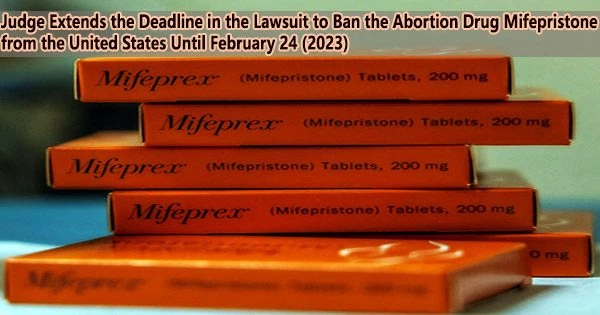A federal judge in Texas has extended the deadline for a lawsuit attempting to reverse the Food and Drug Administration’s approval of the abortion pill until February 24, 2023.
On Thursday, Judge Matthew Kacsmaryk ordered Danco Laboratories, one of the firms that manufactures the tablet, to outline its opposition to the attempt to remove the medication from the U.S. market. The original plaintiffs in the action, anti-abortion physicians, have until February 24 to reply.
“Briefing will then be closed on the matter, absent any ‘exceptional or extraordinary circumstance,’” Kacsmaryk wrote.
A group of physicians opposed to abortion called the Alliance for Hippocratic Medicine sued the FDA in November over the agency’s more than two-decade-old clearance of mifepristone.
Used in combination with misoprostol, mifepristone is the most common method to terminate a pregnancy in the U.S., accounting for about half of all abortions.
“Forcing FDA to withdraw a longstanding approval would seismically disrupt the agency’s governing authority as to whether drugs are safe and effective, and would cause Danco direct and immediate harm by shuttering its business,” the attorneys for the abortion pill maker Danco Laboratories told the court on Friday.
The abortion rights group NARAL Pro-Choice America, in an analysis published Friday, said 40 million women would lose access to the abortion pill if the Alliance for Hippocratic Medicine succeeds and mifepristone is effectively banned.
The alliance contended that the FDA overstepped its bounds when it approved mifepristone in 2000 under an expedited procedure for new medications that provide patients with serious or life-threatening conditions with more benefits than those currently on the market.
The FDA, in its response, called the lawsuit “extraordinary and unprecedented.” The agency’s lawyers said they could not find any previous example of a court second-guessing an FDA decision to approve a drug.
The agency also said mifepristone was not approved under an accelerated pathway. It took more than four years from the filing of the initial application until the pill was approved.
Based on a wealth of scientific data, the FDA authorized mifepristone as a safe and efficient way to end an early pregnancy, according to the agency’s lawyers. The drug regimen is safer than childbirth or surgical abortion, according to decades of experience among thousands of women, the lawyers argued.
The FDA warned that pulling mifepristone from the U.S. market would result in worse health outcomes for patients who rely on the pill to safely end pregnancies. It would also weaken the FDA’s drug approval powers and hinder development by creating regulatory uncertainty in the marketplace.
“If longstanding FDA drug approvals were so easily enjoined, even decades after being issued, pharmaceutical companies would be unable to confidently rely on FDA approval decisions to develop the pharmaceutical-drug infrastructure that Americans depend on to treat a variety of health conditions,” the Biden administration lawyers wrote.
Two separate lawsuits are also seeking to overturn state restrictions on mifepristone, arguing that they conflict with FDA regulations.
GenBioPro, another company that makes the pill, is suing to overturn West Virginia’s ban on these grounds. A physician in North Carolina has also sued to toss out restrictions on mifepristone in that state.
Republican attorneys general in 20 states also recently warned CVS and Walgreens against mailing the abortion pill in their states, indicating that they would take legal action.
CVS and Walgreens, the nation’s two largest drugstore chains, are in the process of getting certified to dispense mifepristone in states where it is legal to do so.
The FDA recently modified its rules to permit retail pharmacies, if they are accredited, to sell prescription medications.
















